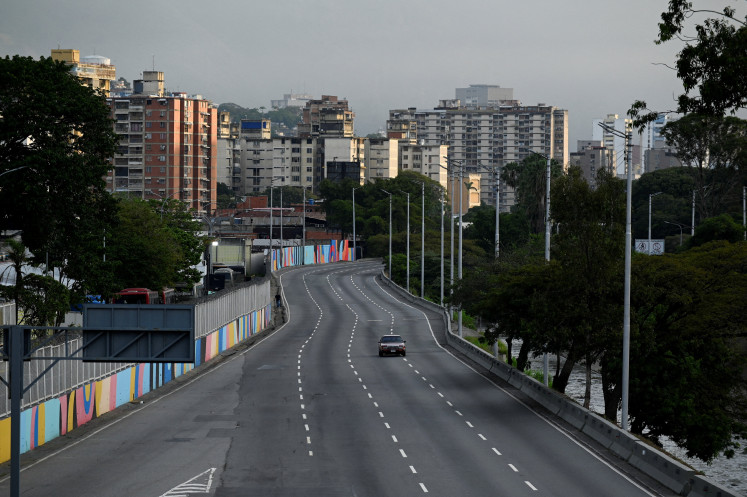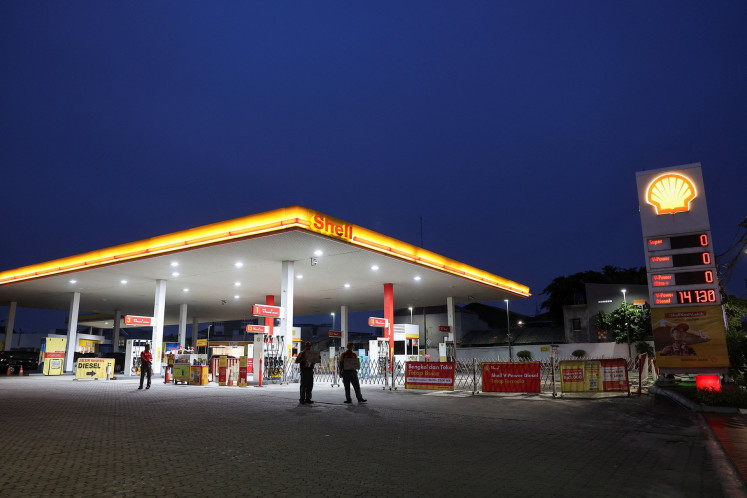Popular Reads
Top Results
Can't find what you're looking for?
View all search resultsPopular Reads
Top Results
Can't find what you're looking for?
View all search resultsCarbon stocks in RI forests, not yet settled
The total amount of carbon emissions that could be stored in Indonesian forests is still "unsettled" given possible impacts of regional autonomy and severe threats of forest fires
Change text size
Gift Premium Articles
to Anyone
T
he total amount of carbon emissions that could be stored in Indonesian forests is still "unsettled" given possible impacts of regional autonomy and severe threats of forest fires .
Senior ministerial advisor on partnerships at the forestry ministry, Wandojo Siswanto said forest fires would significantly reduce stocks of carbon emissions that could be traded on the international market once the Reducing Emissions from Deforestation and Forest Degradation (REDD) scheme was agreed.
"The creation of new regencies will also cause massive forest conversions that would accelerate the deforestation rate," he told reporters at a press conference Thursday.
"So, we must be careful with emissions data from the forests."
He said the total of carbon emissions in forest is "dynamic data".
He said that there were many predictions of carbon stocks in Indonesia's forests, including by the National Council on Climate Change (DNPI), Indonesia's focal point for climate change issues, established by President Susilo Bambang Yudhoyono in 2008.
"But, emissions figure issued by the council are still in question both in local and international forums," said Wandojo.
"This is not the standpoint of the Indonesian government at the formal negotiation table."
A study by DNPI showed the country's greenhouse gas emissions were expected to jump to 3.6 gigatons by 2030, from 2.3 gigatons in 2005 of which more than 80 percent were from the forestry sector. It also predicted the emissions would increase by 2 percent annually.
DNPI secretary-general Agus Purnomo said the emissions data was only a projection for the country to work with to help cut emissions.
"We will revise it once the government issues its second national communication by the end of September," he told The Jakarta Post.
The national communication is an official document outlining the country's greenhouse gas emissions data to be submitted to the UN.
The Office of State Minister for the Environment said that it was facing difficulties to finish the emission document as some ministries had yet to submit reports on this.
A source said that the forestry ministry had yet to submit its emissions report as its contribution towards the national document.
Negotiators from 190 countries gather in Bangkok from Sept. 28 to Oct. 9 to discuss carbon emissions cuts, including REDD, ahead of the December Copenhagen meeting.
The Copenhagen meeting would decide whether or not the REDD scheme should be included in the new climate pact to replace the Kyoto Protocol, which expires in 2012.
Once agreed, forest nations, including Indonesia, could raise billions of dollars by trading the carbon sinks in their forests to developed nations to help them meet emissions reduction targets.
Global annual revenue from REDD credits could reach US$5 to $20 billions, the UN says.
A climate expert from the Center for International Forestry Research (CIFOR) Daniel Murdiyarso predicted Indonesia could earn up to $15 billion of financial incentives by avoiding forest destruction under the REDD mechanism.
Debate still rages over whether an REDD scheme, once all the measuring, monitoring and verification systems have been agreed, should be funded entirely by the market, only by public funds, or a mixture of both.
Indonesia is the first country to issue a regulation on REDD, allowing indigenous peoples, local authorities, private organizations and businesspeople, both local and foreign, to run REDD projects.
Under the regulation, permits for REDD projects may only be granted to people or groups that have ownership certificates for the forests.
Several private firms have currently developed REDD pilot projects.










